Today, several students from my classes “wrap things up” in the final post of this series.
“The temptations are REAL!”
Lee Xiong is a junior at Luther Burbank High School:
School has been tough. Transferring to all online learning has been the biggest challenge this year for me. As a student, I’d say I’ve usually kept up with all my work for all my classes. The biggest change I’ve seen in myself is becoming less focused with my school work.
Being in a physical classroom is tremendously different from learning online. In a classroom, most of your focus is there, unlike virtually, the temptations are REAL! Yes, self-discipline is good to learn, but when having all this thrown at you, you can’t blame the student for not wanting to work... at least that’s my opinion.
This online learning has affected me personally because during this time, I found myself turning in assignments weeks late. It wasn’t because I was having trouble, it was because I had no motivation and energy to do them. This isn’t the norm for me. Without a routine schedule, I felt lost. That makes me sound like a robot, but I think it’s because it’s been that way since we were so small, change this big is affecting me to the max.
This has taught me that online learning will not be for me in the future! Maybe for one or two classes, but overall I plan for my school life to be set in a physical classroom for the most part. Although this has been a challenging time for school and out in the real world, remembering to stand tall will get us through this together.
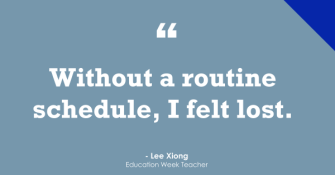
“Learning at school is best for me”
Evelynn Vang is a junior at Luther Burbank High School:
The online learning experience as a student for me has been fine. I sometimes find myself not interested in doing my assignments and I feel like I’m lazy. I still do the assignments, but I sometimes end up turning in my assignments late. It’s like I’ll do the assignments whenever I feel like doing it.
I can say that there is a reason for this, and that is where I am doing my school work. My home is not a learning environment like at school, where there are teachers, other students, learning tools, desks/tables, chairs, a library, lots of space, and those who you can get support from. At home is like a sleeping or resting environment. In a classroom, I can focus more on my assignments/work and get engaged in the subject. Whenever I’m in a classroom, I feel prepared to learn and get my brain pumped; at home, I feel like it’s very hard to be prepared because I’m always getting distracted. Whenever I need help, my teachers or classmates are there for me. When I have a question at home, I have to wait for a response.
I do have to say that whenever I’m at school, I always feel nervous in class. Now that I’m at home learning, I don’t feel nervous. From my online learning experience right now, I would not choose more online learning in the future because in a school, a classroom is a learning environment. Also, I feel like it’s easier to communicate with my classmates/groups for projects, teachers, counselors, and principal. Learning at a school is best for me.
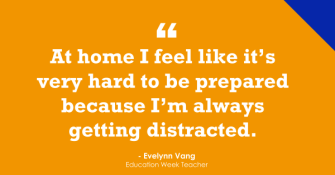
“I have many responsibilities at home”
Diana Lopez is a junior at Luther Burbank High School:
As a student, my online learning experience hasn’t been great. This new learning system has its perks, such as more time to do assignments in the comfort of your home, not having to wake up so early to go to school, and ensuring the safety of the staff as well as the students. Despite these benefits, there are downsides of this method of learning. For example, I have many responsibilities at home, such as taking care of my younger siblings, cooking meals, cleaning up after them, etc. I also find it harder to have any motivation when I’m doing school assignments. When I’m surrounded by all these other temptations like my phone or other electronics, I lose any will to do work.
The environment at home is different from the workspace students have at school. A classroom provides a quiet academic place to do work while a household can be loud and cause students to lose concentration or not even work at all. Additionally, I find that simply reading the instructions for an assignment or lesson isn’t as engaging as when it’s explained by a teacher. The information is much easier to retain when heard rather than simply rushing to read the directions. If I could choose, in the future I would not like to do more online learning because I like having a teacher physically there to help me when I need it. Having a teacher presence helps me focus more on school work, engages me into learning, and the teachers help guide me through the work and are there for any questions I have.
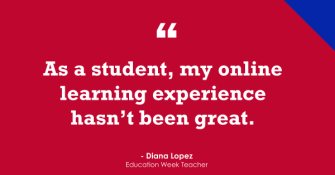
“Online learning has been difficult”
Isabella Sandoval is a junior at Luther Burbank High School:
Online learning has been difficult. I feel pressured to try and hurry to finish and turn in all of my assignments on time. Most of my assignments are due at the same time, and a lot of them are time- consuming.
Though, for the most part it’s difficult to adapt to since I’ve had my education in person with my teachers and classmates, I like how I can do the assignments on my own time. I could divide the day and time I complete my work, I can sleep in a little longer, and overall just be comfortable while in my own home. I feel that online learning is nothing compared to physical learning. With physical learning, I can talk to my teachers one on one and visually see and interact with everything. Whereas online, when I have a question, I either have to email or text my teachers, and sometimes they don’t see my message and/or take forever to respond.
In the future, I honestly would not mind doing online learning. Just for a little bit though, because it’s not that bad, it’s just the fact that I can’t physically talk to my teachers in person when I need help or have questions. Communicating with teachers online is what I feel is the most difficult part about online learning.

“My online experience has been interesting”
Brenda Hernandez is a junior at Luther Burbank High School:
As a student, my online experience has been interesting. What I like about this experience is that I have more time to talk to my family and call or text some friends. I get to do school work from home and I have time for self-care. I like that I kind of get to choose which classes I should work on first and which I could wait to do after.
What I don’t like about it is that I am on a screen all day. I like electronics, but school has kept me from staring at a screen for hours. I also don’t like that I have more distractions at home. I live in a small apartment with five other people and four dogs.
This experience is different from being in a physical classroom because I socialize less now. In school, I get to hear the opinions and ideas of my friends and classmates. Some of my teachers would tell us to talk to the people around us about the lesson. Now, not everyone’s online at the same time. I have anxiety, which prevents me from texting some friends and some of my classmates. And if I did, they’d take a while to respond. Same with communicating with teachers.
In the future, if I could choose, I’d like to do a bit of online learning and the rest in an actual classroom. Although it depends on the class. I have noticed that some of the classes I’ve been able to complete at home since there isn’t anyone asking questions or reading the directions to stall me from beginning my work. In other classes, it has been more difficult since I’m more of a visual learner for that subject, and my teachers keep me on task.
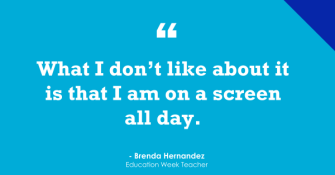
“My online learning experience hasn’t been the best but not worst experience”
Laitak Briand is a junior at Luther Burbank High School:
Being an engaging student during quarantine has been difficult. There have been a lot things that happened during the first weeks since school was canceled. Stores began to close down, parks being shut down, and people told to stay in the house 24-7 unless they needed their necessities.
What I liked about it, though, is that I have more time to do things that I said I wanted to do if I only had time. Now I have time to do things like spend time with family and resting. What I don’t like about online learning is that I have to still do homework even though we are in a pandemic and can’t leave the house.
The experience from doing online learning and going to school physically are vastly different. With online classes, if you need help you have to ask your parents or google. But when you go to school, there is a teacher that can help you. Also, my friends I can’t physically see them when I’m at home, but if I went to school, I could. In the future, if I had to choose to continue online learning or not, I’d choose not because I like to be somewhere I can ask someone near me for help and see if I did something right or wrong. In conclusion, my online learning experience hasn’t been the best but not worst experience I have ever had.
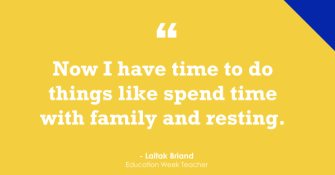
“There is nothing that I liked about it besides how supportive the teachers have been”
Na Lee Her is a junior at Luther Burbank High School:
My experience with online learning is very stressful and hard. I felt this way because of how hard it is for me to understand the assignments and having to not be able to check with your teacher face to face if you are doing it correctly or not. It doesn’t make me confident because I want to make sure that I am actually doing the assignment correctly in order to deserve the credit for it.
Not only that, but having time to do the assignments is another problem. At home, there are many things to take care of, and it makes it hard for me to be able to do my assignments. This makes me turn in the assignment late or not turn it in at all. Last but not least, it is the lack of motivation that makes online learning hard. Not being able to be face to face with friends and teachers gives me no motivation and makes me unhappy about this. I am unable to get ideas from them, and it makes me lose hope because I don’t know what I will do to be able to complete the assignment and meet its requirement. It just makes me very worried and anxious to know that I may have done things wrong or to not know what to do.
During this time of online learning, there is nothing that I liked about it besides how supportive the teachers have been. If I were to choose online learning or learning face to face, I would rather choose learning face to face. I choose this because it is much easier and I get my questions answered right away. Not only that, but I can also get suggestions/ideas from my peers as well.

Thanks to Lee, Evelynn, Diana, Isabella, Brenda, Laitak, and Na Lee for their contributions!
(This is the final post in a multipart series. You can see Part One here, Part Two here, and Part Three here.)
Here is the new question-of-the-week:
What has your online learning experience been as a student? What did you like about it? What didn’t you like about it? How does it compare with your experience as a student in a physical classroom? In the future, if you could choose, would you want to do more online learning? If so, why? If not, why not?
In Part One, five students from the high school where I teach in Sacramento, Calif., shared their reflections.
In Part Two, contributions come from students in Austin Green’s 1st grade class in Utah and others connected with the Kansas State School for the Blind.
In Part Three, contributors came from my class; Ryan Jakacki’s class in Plymouth, Minn.; and Anne Magnin’s class in France.
Consider contributing a question to be answered in a future post. You can send one to me at lferlazzo@epe.org. When you send it in, let me know if I can use your real name if it’s selected or if you’d prefer remaining anonymous and have a pseudonym in mind.
You can also contact me on Twitter at @Larryferlazzo.
Education Week has published a collection of posts from this blog, along with new material, in an e-book form. It’s titled Classroom Management Q&As: Expert Strategies for Teaching.
If you missed any of the highlights from the first eight years of this blog, you can see a categorized list below. The list doesn’t include ones from this current year.
This Year’s Most Popular Q&A Posts
Best Ways to Begin the School Year
Best Ways to End the School Year
Student Motivation & Social-Emotional Learning
Cooperative & Collaborative Learning
Teaching English-Language Learners
Entering the Teaching Profession
I am also creating a Twitter list including all contributors to this column.

